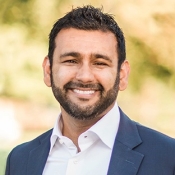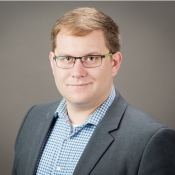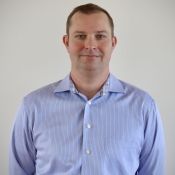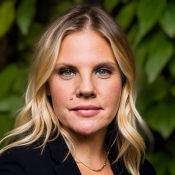New fellowship to help older adults prepare for ‘third stage’ of life after retirement
A new program designed for older adults aims to continue their education after retirement and solve real-world issues at the same time.
The Distinguished Innovation Fellows (DIF) program will launch this fall with a pilot of 10 to 12 fellows, all over the age of 50. The innovative program dedicated to lifelong learning will be housed within the Difference Engine at the Sandra Day O’Connor College of Law at Arizona State University. The Difference Engine is an academic center with a footprint in Phoenix and Los Angeles that allows students to work with ASU thought leaders to create products intended to reduce the effects of inequality across the nation.
“It can be frustrating for adults at or near retirement to switch contexts,” said Ehsan Zaffar, executive director of the Difference Engine and professor of practice at ASU Law. “These highly accomplished people have a lot to contribute and don’t necessarily want to continue in their current roles in the third stage of their career. That’s where our program comes in: We provide a curated educational environment for individuals to plan and launch their next big idea — while also contributing to our students' work to combat inequality.”
The eight-month fellowship will allow fellows to bring in an idea for a global problem to tackle and pair them with a faculty member, or "thought partner," at ASU. They will take up to three classes per semester for two semesters, with a weekly seminar given by Assistant Professor Aaron Guest, a learning specialist for older adults. Simultaneously, fellows will work with and mentor Difference Engine students as they build products to combat inequality, bringing their decades of work experience to the table. The fellowship will culminate with an event showcasing their months of work.
“Inclusion is central to the missions of both ASU and the Sandra Day O’Connor College of Law. That means meeting students — of all ages — where they are in their journey,” said Willard H. Pedrick Dean and Regents and Foundation Professor of Law Stacy Leeds. “ASU Law delivers legal knowledge in varied and innovative ways, including empowering people who have already been difference-makers to reinvent themselves and their impact for the future.”
The program will be made possible through a generous donation from Robert Pozen, which the ASU Office of the President will match.
"There is a growing group of accomplished professionals between the ages of 50 and 75 who are transitioning to the next chapter of their lives. But there are many challenges in figuring out how to make this important transition,” said Pozen, a senior lecturer at MIT Sloan School of Management and a nonresident senior fellow at the Brookings Institution. “The DIF program facilitates this transition by giving these professionals a faculty advisor who will help them sign up for relevant ASU courses and develop an innovative plan for their next chapter — which could be a new business, an expanded nonprofit or an advocacy role. These fellows will make a difference!"
Guest, an assistant professor of aging with the Center for Innovation in Healthy and Resilient Aging at ASU, will be teaching a weekly seminar and working closely with the fellows during their time at ASU. He understands that older adults have lived full lives and may learn differently than younger college students, and that their needs will be different as nondegree-seeking students.
“Often, individuals who come into these programs have a lot of experience to share,” he said. “We can’t negate that, and we don’t want to; we want to help build it up and have them share what they’ve done in the past. The program will be tailored to individuals based on their interests and needs. We want them to engage in classes at ASU that will be beneficial to them.”
Jared Swerzenski, director of the Osher Lifelong Learning Institute (OLLI) at Arizona State University, also an advisor of the program, believes the DIF will set ASU apart from other midlife programs due to its immersive nature.
“Older adults want to know things they didn’t know before,” Swerzenski said. “It’s a misconception that they just want to be in the classroom, but they really want experiential learning and immersive experiences taught by one of the experts in that field. They want to solve a problem too, not just learn about it."
Another close advisor is Lindsey Beagley, senior director of lifelong university engagement, who has led the integration of Mirabella at ASU senior residents into the university ecosystem. According to Beagley, there are more people over the age of 65 than under 18 for the first time in human history, but there isn’t a cultural narrative about how older adults can and should spend the next 20 to 30 years of their lives with purpose.
“The program will leverage the skills and knowledge of the most experienced people in our society and redirect those skills toward social impact, social justice and equity issues,” she said. “It’s not just about keeping them learning; these are the people who can help us move the needle on really tricky social justice issues.”
For Beagley and everyone involved in developing this new venture, this is one important step of many in ASU’s mission to include, rather than exclude.
“With the development of the ASU Learning Enterprise and programs like this, ASU is already a place where you can keep coming back across your life span,” she said. “We have to abandon this old thinking that learning is just for the beginning of your life and it’s just for a degree. It’s just not true, and it’s not a sustainable way of thinking.”
Those interested in applying for the Distinguished Innovation Fellows program are invited to learn more at an informational session on March 14. RSVP on the Difference Engine website.
More Law, journalism and politics

A new twist on fantasy sports brought on by ASU ties
A new fantasy sports gaming app is taking traditional fantasy sports and mixing them with a strategic, territory-based twist.Maptasy Sports started as a passion project for Arizona State University…

'Politics Beyond the Aisle' series to explore the stories of public officials
In an effort to build a stronger connection between students and political and civic leaders, Arizona State University’s School of Politics and Global Studies hosted the first event of its new series…

ASU committed to advancing free speech
A core pillar of democracy and our concept as a nation has always been freedom — that includes freedom of speech. But what does that really mean?Higher education doesn’t have an agenda to curate a…





